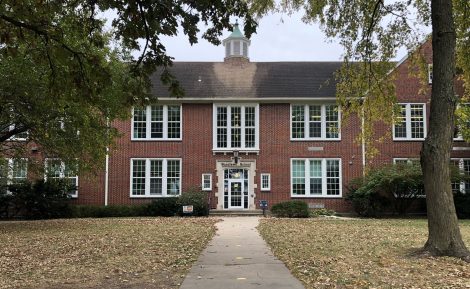Leaders say a new behavioral health coalition in Douglas County would make crisis response more effective and coordinated

photo by: Josie Heimsoth/Journal-World
Douglas County commissioners met on Wednesday, October 23, 2024 at the Douglas County Public Works building, 3755 E 25th St., for their business meeting.
Despite Douglas County’s recent investments in mental health crisis response, leaders say there are still places to improve — especially in how first responders, care providers and other agencies work together.
That’s why they’re proposing a new coalition on behavioral health that will make it easier for agencies to collaborate to get people the right kind of care at the right time.
During a work session before its meeting on Wednesday, the Douglas County Commission heard a presentation about some of the proposed changes to the county’s behavioral health crisis system, including the plan to form the new coalition that would provide oversight and bring service providers together.
Bob Tryanski, the county’s director of behavioral health projects, said the coalition would be called the Douglas County Crisis Response Coalition and would consist of at least 20 positions filled by a range of first responders, behavioral health specialists and representatives from both the city and county. This includes a representative from Bert Nash Community Mental Health Center and the county administrator and sheriff or their designees.
The idea would be for all of these stakeholders to work together to improve the county’s behavioral health response, and not to be stuck in their own silos, Tryanski said.
“It creates a structure for the partners to be accountable to things that are in the best interest of the system versus the best business of their agency or the best interest of the department as a part of the system,” Tryanski said.
The coalition would work to minimize reliance on emergency services and to provide more appropriate kinds of care in the right location and at the right moment, according to the drafted mission statement for the group. That way, the system would be focused less on reacting only in a crisis, and more on recovery and prevention as standard practice.
There are already a few concrete goals in mind for the coalition, which is expected to be established before the start of 2025. They include reducing the number of people visiting the emergency department for behavioral health crises by 25%; increasing the number of 911 calls directed to an alternative mobile crisis response team by 10% annually; and lowering the number of individuals with serious and persistent mental illness at the Douglas County Jail by 5%.
Tryanski said optimizing the crisis system would also involve rethinking the structure and membership of a group that already exists, known as the Douglas County Crisis Intervention Team Council. This group’s mission would be broadened, and it would be charged with enhancing public safety and promoting mental health and wellness for law enforcement, first responders and community partners.
Lawrence Police Chief Rich Lockhart said that if all of the entities involved can come together and see how their services overlap, there will be benefits for the community.
“It’s not accountability in the traditional sense,” Lockhart said. ” … I think (that) part of the coalition we’re looking at is how do we all lend our creativity to this?”
In other business, commissioners:
• Voted to establish an Emergency Communications Center Board and approve bylaws for the board.
In February, the county signed an agreement with the cities of Lawrence, Baldwin City and Eudora to operate and fund the county’s Emergency Communications Center. This agreement followed a 10-month effort to update a 1994 agreement, during which stakeholders collaborated with the Public Policy and Management Center at Wichita State University to evaluate the county’s emergency communications processes.
One recommendation from that assessment was to formalize the existing 911 Board into an Emergency Communications Center Board, establishing a set of bylaws to clearly define its functions.
The proposed bylaws will be reviewed by the City of Eudora on Oct. 28, the City of Lawrence on Nov. 5, and the Baldwin City Public Safety Committee, which had not yet scheduled a review date when the meeting agenda was released.
• Approved a request to rezone approximately 20.12 acres at 1231 North 400 Road from AG-1 (Agricultural) to AG-2 (Transitional Agricultural).
The property owner wanted to rezone to enable the property to be split into two 10-acre parcels. Several neighbors submitted letters of opposition with concerns about development that could encroach on agricultural activities and disrupt the environment.
• Authorized county staff to accept a $50,000 grant to help the Douglas County Food Policy Council conduct a yearlong project to study the food-related needs of Indigenous residents.
The grant – which will fund the council’s Indigenous Food System Study and Action Plan – was a Hunger Free Kansas Transformation Grant awarded by the Kansas Health Foundation. The project will gather input on food policy from Native food leaders and entrepreneurs — “farmers, chefs, retailers, and elders.” The Food Policy Council plans to hire Indigenous experts to conduct surveys, interviews and focus groups about Native food systems that will guide food policy recommendations in Douglas County and for other food councils statewide.
As the Journal-World reported, after the project is complete, the council hopes to eventually develop an Indigenous Foodways Cultural Center and Grocery pilot program. The grocery store would include locally sourced and culturally significant Indigenous foods and it would serve as a hub for knowledge about Indigenous food culture, offering workshops on Native foodways and food sovereignty.
• Approved the 2024 year-end report for juvenile community corrections. Each year, Criminal Justice Services-Juvenile Community Corrections submits this report to the Kansas Department of Corrections, outlining the progress, challenges, and any adjustments made to the agency’s goals during the annual grant cycle.
• Held an executive session for the purpose of consulting with the county counselor “on matters which would be deemed privileged under the attorney-client relationship.”







